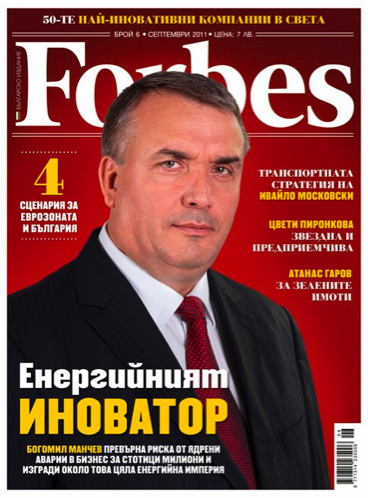
This week edition of Forbes - Bulgaria features Bogomil Manchev on the cover page. Manchev who's presented by Forbes as an "energy innovator" has been exposed in a secret diplomatic cable from Sofia, revealed by WikiLeaks. Bivol reminds the excerpts about Manchev from the cable named DIRTY ENERGY: CORRUPTION AND LACK OF TRANSPARENCY PLAGUE BULGARIAN ENERGY SECTOR [06SOFIA1691], sent 2006-12-20 by the chargé d'affaires in the US Embassy in Sofia - Alex Karagianis
BULGARIA'S ENERGY MAFIA: BOGOMIL MANCHEV ¶7. (C) Three names always mentioned as key players in Bulgaria's so-called "energy mafia" are Bogomil Manchev from Risk Engineering, Krassimir Georgiev from Frontier and Hristo Kovachki. Manchev and Georgiev have been omnipresent in the sector since the early 1990s, while Kovachki is considered a new player. ¶8. (C) Bogomil Manchev's presence in the energy field, particularly the nuclear sector, is pervasive. His engineering and consulting company, Risk Engineering, founded in 1992, got its start working as a subcontractor for Westinghouse for a EU Phare project related to Kozloduy's Units 1-4. From there, Manchev and Risk's influence grew as he won successive Phare projects for improving safety and security measures at Kozloduy Units 3 and 4, preparing documents for the development of Bulgaria's uranium mines in Simitli and Dospat, assessing a potential national storehouse for radioactive waste, etc. ¶9. (C) By the time of Prime Minister Simeon Saxe-Coburg Gotha's
by Alexandre Lévy, Western Balkans Printed in Le Monde 03 July 2011 edition
Since the beginning of the Greek crisis, the issue of bank stability and in particular of the bank system in the neighboring countries had been raised insistently. An issue even more pertinent if we take into account the fact that Greece is one of the most important investors in the region, notably in this sector. So, in Bulgaria at least five important banks are headquartered in Athens (United Bulgarian Bank, Postbank, Piraeus Bank Bulgaria, Emporiki Bank Bulgaria and Alpha Bank Sofia), representing nearly 30% of the sector. And since the start of the crisis, those responsible have been busy with reassuring the public opinion and the social political class, particularly after concerns expressed publically in March, 2010 by Finance Minister, Simeon Djankov, about the possibility of siphoning of local funds by their parent bank.
On October 26, 2005, on the so-called “government route” on “Bulgaria” boulevard in Sofia, banker Emil Kuylev was gunned down. Immediately after the murder, the top people in the country – Interior Minister, Rumen Petkov, Chief Prosecutor, Nikola Filchev, and President Parvanov publically declared that Kyulev’s business was “clean.”
The American Ambassador in Sofia at the time, John Beyrle, however, has been of a different opinion since the same afternoon he sent to the State Department a report titled “TOP BULGARIAN MONEY LAUNDERER SHOT DEAD IN SOFIA” [05SOFIA1847]. He does not mention the name of the “top launderer,” but provides in the text a thorough biography and business portrait of Kuylev – a former policeman, who had used his connections in the services to create consulting businesses, and later a bank, in partnership with Michael Chorny, receiving a “sweetheart deal” from the State – the right to handle, through Roseximbank, all payments of the Bulgarian Tax Directorate and the Customs Agency, as well as the operations of the biggest tax-payers in the country; a founder of Vazrajdane Business Club along with Multigroup boss Iliya Pavlov (shot dead in 2003) and Vasil "The Skull" Bozhkov; a former advisor to President Georgi Parvanov and, (according to unconfirmed reports), a major political campaign sponsor of the National Movement for Stability and Prosperity (NDSV) party of former King and Prime Minister Simeon Saxe-Coburg, of the Bulgarian Socialist Party, BSP, and of Parvanov himself for his 2001 campaign – these are the traits of the image of one of the wealthiest people in Bulgaria.
Kyulev had applied significant effort to clean this image, even hiring an American lobbyist. Seemingly, the result had not been very convincing because, as the Ambassador points out, the Foundation for Fight against Human Trafficking, established by the banker, was suspected in money laundering.
Theme by Danetsoft and Danang Probo Sayekti inspired by Maksimer